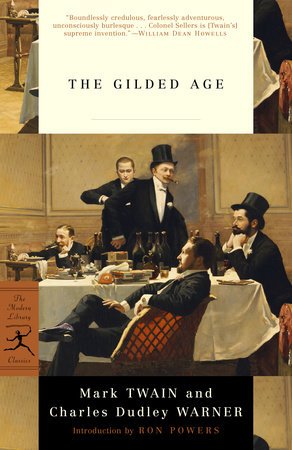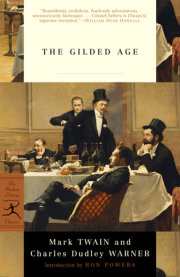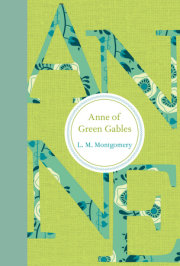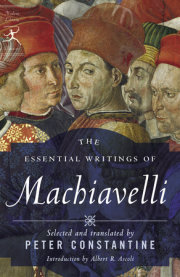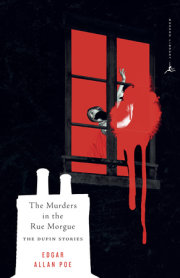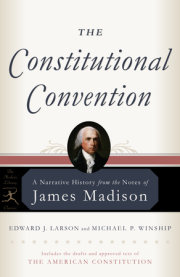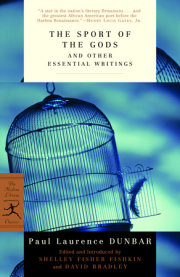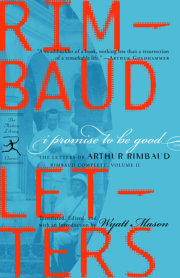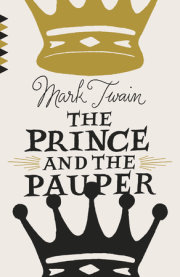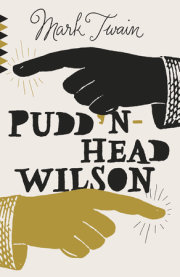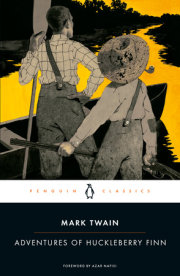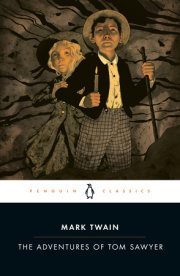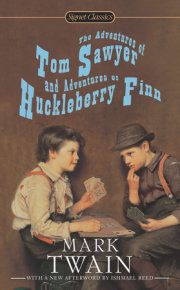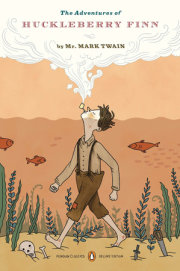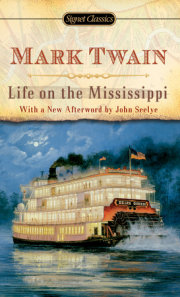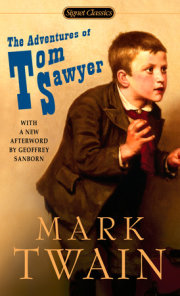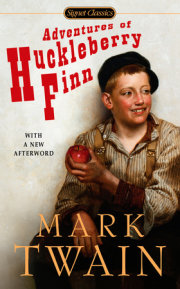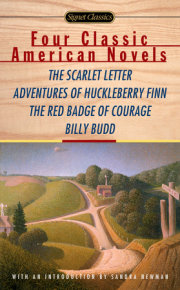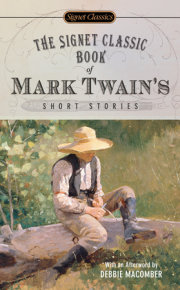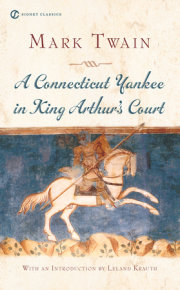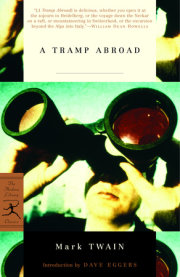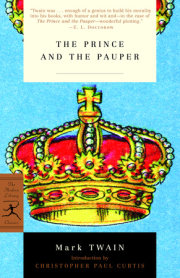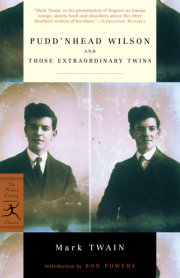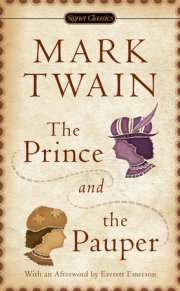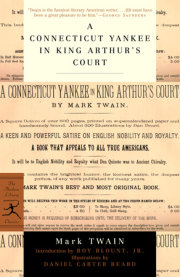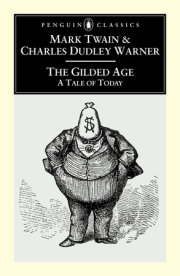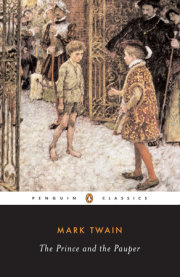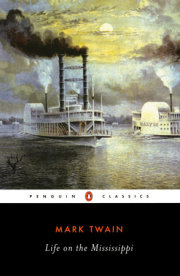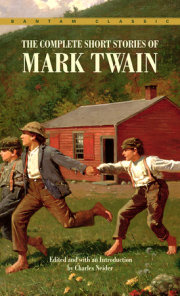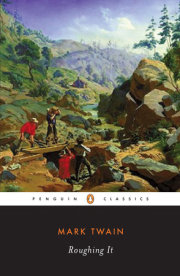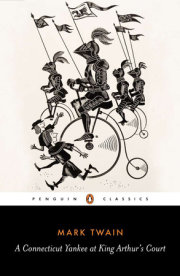Chapter 1 Nibiwa win o-dibendan aki.1
Eng. A gallant tract
Of land it is!
Meercraft. ’Twill yield a pound an acre:
We must let cheap ever at first. But, sir,
This looks too large for you, I see.
June, 18—. Squire Hawkins sat upon the pyramid of large blocks, called the “stile,” in front of his house, contemplating the morning.
The locality was Obedstown, East Tennessee. You would not know that Obedstown stood on the top of a mountain, for there was nothing about the landscape to indicate it—but it did: a mountain that stretched abroad over whole counties, and rose very gradually. The district was called the “Knobs of East Tennessee,” and had a reputation like Nazareth,2 as far as turning out any good thing was concerned.
The Squire’s house was a double log cabin, in a state of decay; two or three gaunt hounds lay asleep about the threshold, and lifted their heads sadly whenever Mrs. Hawkins or the children stepped in and out over their bodies. Rubbish was scattered about the grassless yard; a bench stood near the door with a tin wash basin on it and a pail of water and a gourd; a cat had begun to drink from the pail, but the exertion was overtaxing her energies, and she had stopped to rest. There was an ash-hopper by the fence, and an iron pot, for soft-soap-boiling, near it.
This dwelling constituted one-fifteenth of Obedstown; the other fourteen houses were scattered about among the tall pine trees and among the corn-fields in such a way that a man might stand in the midst of the city and not know but that he was in the country if he only depended on his eyes for information.
“Squire” Hawkins got his title from being postmaster of Obedstown—not that the title properly belonged to the office, but because in those regions the chief citizens always must have titles of some sort, and so the usual courtesy had been extended to Hawkins. The mail was monthly, and sometimes amounted to as much as three or four letters at a single delivery. Even a rush like this did not fill up the postmaster’s whole month, though, and therefore he “kept store” in the intervals.
The Squire was contemplating the morning. It was balmy and tranquil, the vagrant breezes were laden with the odor of flowers, the murmur of bees was in the air, there was everywhere that suggestion of repose that summer woodlands bring to the senses, and the vague, pleasurable melancholy that such a time and such surroundings inspire.
Presently the United States mail arrived, on horseback. There was but one letter, and it was for the postmaster. The long-legged youth who carried the mail tarried an hour to talk, for there was no hurry; and in a little while the male population of the village had assembled to help. As a general thing, they were dressed in homespun “jeans,” blue or yellow—there were no other varieties of it; all wore one suspender and sometimes two—yarn ones knitted at home,—some wore vests, but few wore coats. Such coats and vests as did appear, however, were rather picturesque than otherwise, for they were made of tolerably fanciful patterns of calico—a fashion which prevails there to this day among those of the community who have tastes above the common level and are able to afford style. Every individual arrived with his hands in his pockets; a hand came out occasionally for a purpose, but it always went back again after service; and if it was the head that was served, just the cant that the dilapidated straw hat got by being uplifted and rooted under, was retained until the next call altered the inclination; many hats were present, but none were erect and no two were canted just alike. We are speaking impartially of men, youths and boys. And we are also speaking of these three estates when we say that every individual was either chewing natural leaf tobacco prepared on his own premises, or smoking the same in a corn-cob pipe. Few of the men wore whiskers; none wore moustaches; some had a thick jungle of hair under the chin and hiding the throat—the only pattern recognized there as being the correct thing in whiskers; but no part of any individual’s face had seen a razor for a week.
These neighbors stood a few moments looking at the mail carrier reflectively while he talked; but fatigue soon began to show itself, and one after another they climbed up and occupied the top rail of the fence, hump-shouldered and grave, like a company of buzzards assembled for supper and listening for the death-rattle. Old Damrell said:
“Tha hain’t no news ’bout the jedge, hit ain’t likely?”
“Cain’t tell for sartin; some thinks he’s gwyne to be ’long toreckly, and some thinks ’e hain’t. Russ Mosely he tole ole Hanks he mought git to Obeds tomorrer or nex’ day he reckoned.”
“Well, I wisht I knowed. I got a prime sow and pigs in the cote-house,3 and I hain’t got no place for to put ’em. If the jedge is a gwyne to hold cote, I got to roust ’em out, I reckon. But tomorrer’ll do, I ’spect.”
The speaker bunched his thick lips together like the stem-end of a tomato and shot a bumble-bee dead that had lit on a weed seven feet away. One after another the several chewers expressed a charge of tobacco juice and delivered it at the deceased with steady aim and faultless accuracy.
“What’s a stirrin’, down ’bout the Forks?” continued Old Damrell.
“Well, I dunno, skasely. Ole Drake Higgins he’s ben down to Shelby las’ week. Tuck his crap down; couldn’t git shet o’ the most uv it; hit warn’t no time for to sell, he say, so he fotch it back agin, ’lowin’ to wait tell fall. Talks ’bout goin’ to Mozouri—lots uv ’ems talkin’ that-away down thar, Ole Higgins say. Cain’t make a livin’ here no mo’, sich times as these. Si Higgins he’s ben over to Kaintuck n’ married a high-toned gal thar, outen the fust families, an’ he’s come back to the Forks with jist a hell’s-mint o’ whoop-jamboree notions, folks says. He’s tuck an’ fixed up the ole house like they does in Kaintuck, he say, an’ tha’s ben folks come cler from Turpentine for to see it. He’s tuck an’ gawmed it all over on the inside with plarsterin’.”
“What’s plarsterin’?”
“I dono. Hit’s what he calls it. Ole Mam Higgins, she tole me. She say she warn’t gwyne to hang out in no sich a dern hole like a hog. Says it’s mud, or some sich kind o’ nastness that sticks on n’ kivers up everything. Plarsterin’, Si calls it.”
This marvel was discussed at considerable length; and almost with animation. But presently there was a dog-fight over in the neighborhood of the blacksmith shop, and the visitors slid off their perch like so many turtles and strode to the battle-field with an interest bordering on eagerness. The Squire remained, and read his letter. Then he sighed, and sat long in meditation. At intervals he said:
“Missouri. Missouri. Well, well, well, everything is so uncertain.”
At last he said:
“I believe I’ll do it.—A man will just rot, here. My house, my yard, everything around me, in fact, shows that I am becoming one of these cattle—and I used to be thrifty in other times.”
He was not more than thirty-five, but he had a worn look that made him seem older. He left the stile, entered that part of his house which was the store, traded a quart of thick molasses for a coonskin and a cake of beeswax to an old dame in linsey-woolsey,4 put his letter away, and went into the kitchen. His wife was there, constructing some dried apple pies; a slovenly urchin of ten was dreaming over a rude weather-vane of his own contriving; his small sister, close upon four years of age, was sopping corn-bread in some gravy left in the bottom of a frying-pan and trying hard not to sop over a finger-mark that divided the pan through the middle—for the other side belonged to the brother, whose musings made him forget his stomach for the moment; a negro woman was busy cooking, at a vast fire-place. Shiftlessness and poverty reigned in the place.
“Nancy, I’ve made up my mind. The world is done with me, and perhaps I ought to be done with it. But no matter—I can wait. I am going to Missouri. I won’t stay in this dead country and decay with it. I’ve had it on my mind some time. I’m going to sell out here for whatever I can get, and buy a wagon and team and put you and the children in it and start.”
“Anywhere that suits you, suits me, Si. And the children can’t be any worse off in Missouri than they are here, I reckon.”
Motioning his wife to a private conference in their own room, Hawkins said: “No, they’ll be better off. I’ve looked out for them, Nancy,” and his face lighted. “Do you see these papers? Well, they are evidence that I have taken up Seventy-five Thousand Acres of Land in this county—think what an enormous fortune it will be some day! Why, Nancy, enormous don’t express it—the word’s too tame! I tell you, Nancy———”
“For goodness sake, Si———”
“Wait, Nancy, wait—let me finish—I’ve been secretly boiling and fuming with this grand inspiration for weeks, and I must talk or I’ll burst! I haven’t whispered to a soul—not a word—have had my countenance under lock and key, for fear it might drop something that would tell even these animals here how to discern the gold mine that’s glaring under their noses. Now all that is necessary to hold this land and keep it in the family is to pay the trifling taxes on it yearly—five or ten dollars—the whole tract would not sell for over a third of a cent an acre now, but some day people will be glad to get it for twenty dollars, fifty dollars, a hundred dollars an acre! What should you say to” [here he dropped his voice to a whisper and looked anxiously around to see that there were no eavesdroppers,] “a thousand dollars an acre!
“Well you may open your eyes and stare! But it’s so. You and I may not see the day, but they’ll see it. Mind I tell you, they’ll see it. Nancy, you’ve heard of steamboats, and may be you believed in them—of course you did. You’ve heard these cattle here scoff at them and call them lies and humbugs,—but they’re not lies and humbugs, they’re a reality and they’re going to be a more wonderful thing some day than they are now. They’re going to make a revolution in this world’s affairs that will make men dizzy to contemplate. I’ve been watching—I’ve been watching while some people slept, and I know what’s coming.
“Even you and I will see the day that steamboats will come up that little Turkey river to within twenty miles of this land of ours—and in high water they’ll come right to it! And this is not all, Nancy—it isn’t even half! There’s a bigger wonder—the railroad! These worms here have never even heard of it—and when they do they’ll not believe in it. But it’s another fact. Coaches that fly over the ground twenty miles an hour—heavens and earth, think of that, Nancy! Twenty miles an hour. It makes a man’s brain whirl. Some day, when you and I are in our graves, there’ll be a railroad stretching hundreds of miles—all the way down from the cities of the Northern States to New Orleans—and its got to run within thirty miles of this land—may be even touch a corner of it. Well, do you know, they’ve quit burning wood in some places in the Eastern States? And what do you suppose they burn? Coal!” [He bent over and whispered again:] “There’s whole worlds of it on this land! You know that black stuff that crops out of the bank of the branch?—well, that’s it. You’ve taken it for rocks; so has every body here; and they’ve built little dams and such things with it. One man was going to build a chimney out of it. Nancy I expect I turned as white as a sheet! Why, it might have caught fire and told everything. I showed him it was too crumbly. Then he was going to build it of copper ore—splendid yellow forty-per-cent. ore! There’s fortunes upon fortunes of copper ore on our land! It scared me to death, the idea of this fool starting a smelting furnace in his house without knowing it, and getting his dull eyes opened. And then he was going to build it of iron ore! There’s mountains of iron ore here, Nancy—whole mountains of it. I wouldn’t take any chances. I just stuck by him—I haunted him—I never let him alone till he built it of mud and sticks like all the rest of the chimneys in this dismal country. Pine forests, wheat land, corn land, iron, copper, coal—wait till the railroads come, and the steamboats! We’ll never see the day, Nancy—never in the world—never, never, never, child. We’ve got to drag along, drag along, and eat crusts in toil and poverty, all hopeless and forlorn—but they’ll ride in coaches, Nancy! They’ll live like the princes of the earth; they’ll be courted and worshiped; their names will be known from ocean to ocean! Ah, well-a-day! Will they ever come back here, on the railroad and the steamboat, and say ‘This one little spot shall not be touched—this hovel shall be sacred—for here our father and our mother suffered for us, thought for us, laid the foundations of our future as solid as the hills!’ ”
“You are a great, good, noble soul, Si Hawkins, and I am an honored woman to be the wife of such a man”—and the tears stood in her eyes when she said it. “We will go to Missouri. You are out of your place, here, among these groping dumb creatures. We will find a higher place, where you can walk with your own kind, and be understood when you speak—not stared at as if you were talking some foreign tongue. I would go anywhere, anywhere in the wide world with you. I would rather my body should starve and die than your mind should hunger and wither away in this lonely land.”
“Spoken like yourself, my child! But we’ll not starve, Nancy. Far from it. I have a letter from Eschol Sellers—just came this day. A letter that—I’ll read you a line from it!”
He flew out of the room. A shadow blurred the sunlight in Nancy’s face—there was uneasiness in it, and disappointment. A procession of disturbing thoughts began to troop through her mind. Saying nothing aloud, she sat with her hands in her lap; now and then she clasped them, then unclasped them, then tapped the ends of the fingers together; sighed, nodded, smiled—occasionally paused, shook her head. This pantomime was the elocutionary expression of an unspoken soliloquy which had something of this shape:
Copyright © 2006 by Mark Twain. All rights reserved. No part of this excerpt may be reproduced or reprinted without permission in writing from the publisher.

